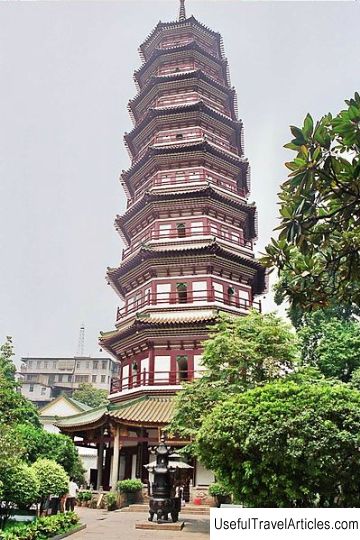Temple of the Six Banyan Trees description and photos - China: Guangzhou
Rating: 8,4/10 (1093 votes) 
Temple of the Six Banyan Trees description and photos - China: Guangzhou. Detailed information about the attraction. Description, photographs and a map showing the nearest significant objects. The title in English is Temple of the Six Banyan Trees. Photo and descriptionThe Temple of the Six Banyan Trees is a historical landmark not only in Guangzhou, but throughout South China. Here are the world famous Buddha statues, the oldest in Guangdong province. The temple was built in 537 and was originally called Boazhuangian (Temple of the Precious Shrine). However, it was rebuilt several times and changed its names. It acquired its modern name in 1099, when the famous poet Su Dong Po wrote the calligraphic poem Six Banyan Trees. Once here, he was so fascinated by the banyan trees he saw that he came up with two special hieroglyphs for them. Subsequently, this became the official name of the temple, although the trees themselves have not survived to our time. The architecture of this place is a whole complex of historical buildings. First of all, it is a beautiful flower pagoda with a height of 57 meters, topped with a bronze column weighing more than 5 tons. According to legend, a monk and a great teacher from India Bodhidharma stayed here. There are several halls inside the temple itself. For example, Tainwang Hall with a statue of a laughing Buddha and Weito Hall (in Buddhist mythology, this is the general who returned the stolen treasures to Buddha). The main room in the temple is the Daxiong Baodian Hall, the Great Hero's Treasure Hall. There are three copper Buddha statues, each weighing 10 tons - the Apothecary Buddha, Shakyamuni Buddha and Amitabha Buddha, symbolizing the future, present and past. And in the hall of Buddha Maitreya there are already gilded statues of the Enlightened One. There are two more separate temples on the territory of the complex. Inside the first one is a statue of Huineng, the patriarch of Chinese Ch'an Buddhism, the founder of the main Ch'an school, who lived in the 7th century AD. The second temple is dedicated to the goddess of mercy Guanyin. Foreign families adopting Chinese children are blessed here. Many unique relics have made the Temple of the Six Banyan Trees a place of pilgrimage for a large number of tourists. Especially on the eve of the Chinese New Year and the Lantern Festival, when huge queues line up to the complex. Many unique relics have made the Temple of the Six Banyan Trees a place of pilgrimage for a large number of tourists. Especially on the eve of the Chinese New Year and the Lantern Festival, when huge queues line up to the complex. Many unique relics have made the Temple of the Six Banyan Trees a place of pilgrimage for a large number of tourists. Especially on the eve of the Chinese New Year and on the days of the Lantern Festival, when huge queues line up to the complex.       We also recommend reading Oparin's house description and photos - Russia - Golden Ring: Gorokhovets Topic: Temple of the Six Banyan Trees description and photos - China: Guangzhou. |




